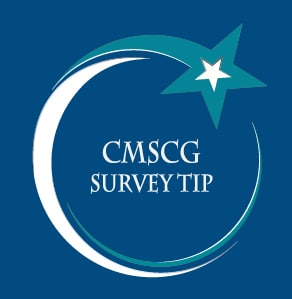Next up on the CMSCG Blog “Ftag of the Week” series, we are going to review the Resident Rights regulation, F571 Limitations on Charges to Personal Funds. This regulation spells out what services can – and can’t – be charged for, and what is supposed to happen when a resident requests services or items.
F571 – Overview
Most of the regulatory statements for F571 are pretty cut and dry, so let’s review those first:
- A facility cannot charge a resident’s personal funds for any service or item that is covered by Medicare or Medicaid, with the exception of applicable deductibles/ coinsurance amounts.
- A resident may be charged for services that he/she requests that cost more or are in excess of services provided by Medicare or Medicaid.
- If a resident specifically requests an item or service that is not covered, then the facility may charge the resident for it.
- A facility is prohibited from requiring a resident to request any item/service as a condition of admission or continued stay at the facility.
Which Services are Covered?
There is a set category of services that a facility may not charge a resident for during a covered Medicare or Medicaid stay. These include:
- Nursing services
- Room/bed maintenance services
- Medically-related social services
- Hospice services that are elected by a resident and paid for by the Medicaid Hospice Benefit or hospice services that are paid for by Medicaid in accordance with a State plan
- Activities program
- Routine personal hygiene items and services required to meet the needs of residents
There is a long list of personal hygiene items included in Appendix PP of the SOM that must be provided to residents without charging them – basically everything that one could need from soap to special cleansing products required for skin care to deodorant, hospital gowns and dental floss. Bathing assistance, hair and nail hygiene services and basic personal laundry services are paid for and may not be charged for.
What Can Be Charged?

F571 also includes a set of items and service categories that can be charged to a resident’s personal funds. There are four criteria that need to be met for the charge to be permitted:
- Item/service is requested by the resident.
- Item/service requested is not required to achieve a goal included in the resident’s plan of care.
- The facility informs the resident that there will be a charge.
- The item/service is not being paid for by Medicare or Medicaid.
Those criteria help to clear up the grey area between what is covered and what is charged for, such as grooming items that are in excess of the payment made by Medicare or Medicaid, or a resident’s request for a private room. Here’s are some basic items that are not covered:
- TV, radio, personal computer or other electronic device for a resident’s personal use. However, residents may not be charged for these items if they are for communal use, such as a tv in a common room or newspapers/magazines delivered for general resident population use.
- Telephone, including cellular phone.
- Personal items including personal comfort items, clothing, reading materials, flowers/plants or gifts purchased on behalf of a resident
Then there’s also some areas that should be clarified:
Activities
Since the activities program is covered by Medicare or Medicaid payment, residents may only be charged the cost of participating in social events or entertainment that fall outside the scope of that program, for example an out of facility trip to eat at a restaurant.
Special Care Services
A nursing home is required to provide sufficient nursing staff, so if a resident wishes to hire a private duty nurse or aide, then this can be charged to the resident.
Remember the criteria for charging a resident for services and then take a look at this survey citation:
F571 S/S: D – Recertification Survey
It was determined that a facility had a resident’s family pay out of pocket for nursing services for 1:1 supervision 24/7 while the resident’s stay was covered by Medicare. The resident had a history of attempting to leave the facility and was care planned for a wanderguard and structured activities. The facility called the family two days after the resident’s admission and stated the family would need to pay for 1:1 supervision because they don’t have enough staff for that level of supervision.
Private Rooms
While over the years the Centers for Medicare & Medicaid Services (CMS) has discussed how private rooms can be more homelike and provide other benefits, the fact remains that what is covered by the Agency is not a single room. Unless it is therapeutically required, the resident may be charged for a private room.
Food
The facility is not allowed to charge for special food items/meals, including supplements that are prescribed by the resident’s physician. A facility is also required to take into consideration its residents’ needs and preferences when planning for meals, including the “overall” religious and cultural breakdown of the resident population. What could be charged for is a specially requested item or alternative meal that is not due to the resident’s need or is not ordered by a physician/practitioner.
On Survey
The Interpretive Guidance (IG) states that surveyors should identify potential issues with charges to personal funds during resident/representative interviews. Surveyors should also inquire how the resident/representative is informed about charges that would be made against their personal funds – before the item or service is provided. If a concern is identified, the resident’s billing statements will be reviewed to determine if the facility charged for a covered item/service.